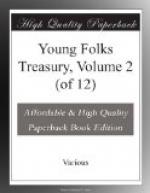The waves still dashed high, the wind still howled, but under Tell’s firm hand the boat seemed to steady itself, and the rowers bent to their work with new courage and strength in answer to his commanding voice.
Tell, leaning forward, peered through the darkness and the spray. There was one place where he knew it would be possible to land—where a bold and desperate man at least might land. He was looking for that place. Nearer and nearer to the shore he steered. At last he was quite close to it. He glanced quickly round. His bow and arrows lay beside him. He bent and seized them. Then with one great leap he sprang ashore, and as he leaped he gave the boat a backward push with his foot, sending it out again into the stormy waters of the lake.
There was a wild outcry from the sailors, but Tell was free, for no one dared to follow him. Quickly clambering up the mountain-side, he disappeared among the trees.
As Tell vanished, Gessler stood up and shouted in anger, but the little boat, rocking and tossing on the waves, drifted out into the lake, and the Austrian sailors, to whom the shore was unknown, dared not row near to it again, lest they should be dashed to pieces upon the rocks. Even as it was, they expected every moment that the boat would sink, and that all would be drowned. But despair seemed to give the sailors fresh strength, and soon the wind fell and the waves became quieter. A few hours later, wet, weary, but safe, Gessler and his company landed on the shore of Schwyz.
[Illustration: WILLIAM TELL AND HIS FRIENDS.]
IV
TELL’S SECOND SHOT
As soon as Gessler landed, he called for his horse, and silent and gloomy, his heart full of bitter hate against Tell and all the Swiss, he mounted and rode towards his castle at Kuessnacht.
But Tell’s heart, too, was full of hate and anger. That morning he had been a gentle, peace-loving man. Now all was changed. Gessler’s cruel jest had made him hard and angry. He could not forget that he might have killed his own boy. He seemed to see always before him Walter bound to the tree with the apple on his head. Tell made up his mind that Gessler should never make any one else suffer so much. There was only one thing to do. That was to kill Gessler, and that Tell meant to do.
If Gessler escaped from the storm, Tell was sure that he would go straight to his castle at Kuessnacht. There was only one road which led from the lake to the castle, and at a place called the Hollow Way it became very narrow, and the banks rose steep and rugged on either side. There Tell made up his mind to wait for Gessler. There he meant to free his country from the cruel tyrant.
Without stopping for food or rest, Tell hurried through the woods until he came to the Hollow Way. There he waited and watched. Many people passed along the road. There were herds with their flocks, and travelers of all kinds, among them a poor woman whose husband had been put in prison by Gessler, so that now she had no home, and had to wander about with her children begging. She stopped and spoke to Tell, and the story she told of Gessler’s cruelty made Tell’s heart burn with anger, and made him more sure than ever that the deed he meant to do was just and right.




